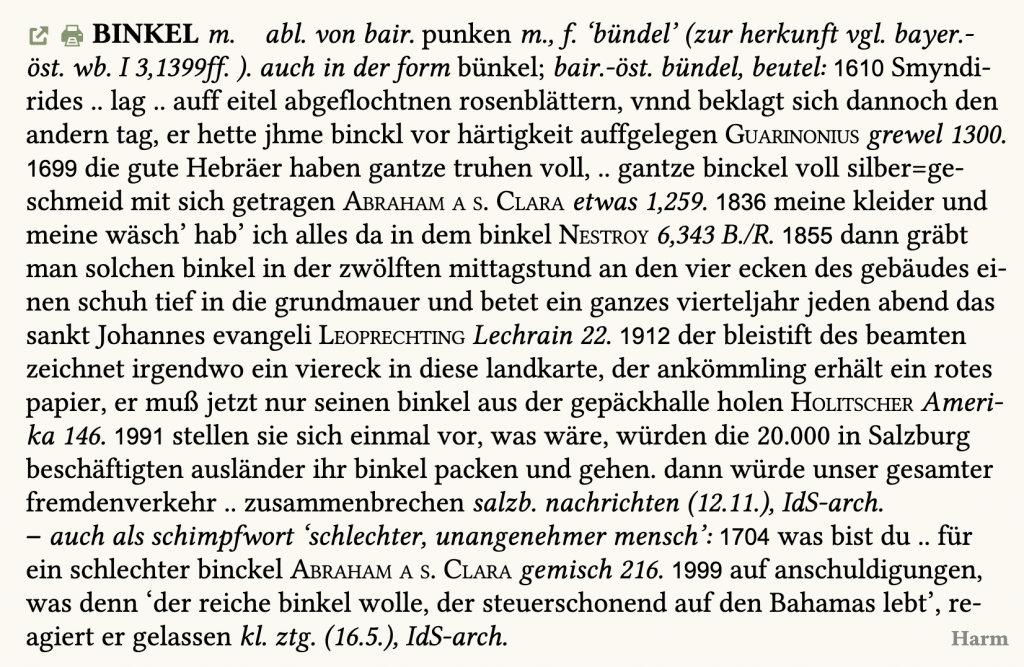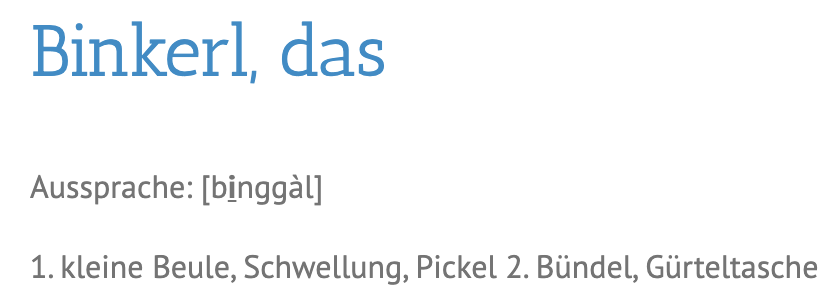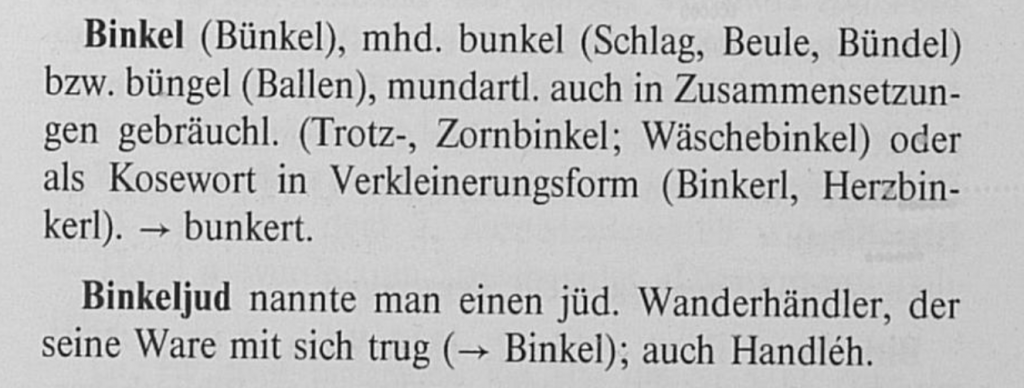Many of the dialect words I encounter are in printed. Though I interact with dialect speakers fairly frequently, there’s an element of on-the-spot communication that keeps me from remembering new words that might sprout up in the conversation. Sometimes I can figure out the meaning from context while I might be lost at other times [When can I start writing “othertimes” so that it follows the patter with “sometimes” & “oftentimes”?]. In these moments when the Mundartgarten swiftly transforms into a Mundartirrgarten [a dialect labyrinth], the person speaking dialect may explain the word, but I then fail to catch the dialect seed before it falls among the thorns.
It’s actually poetry where I encounter and then spend most of my time ruminating on dialect words. After scouring local bookshops (a short endeavor given the paucity of choice), I usually find a few choice book(let)s that find their way to my garden bench. Today’s word “Binkerl” comes from a poem entitled “24. Dezember” by Mathilde Ressmann in her collection of poems Daham im Rosntål (1977). Through all of the searching, I’ve also learned the English word “bindle” (see this photo for an example).
“24. Dezember”
Bleim amål stehn, råst ab a Stündle,
stell hin dei Binkerl für a Weil.
Is nit a Tåg wia jeder andre,
vertrågt nix Lautes und ka Eil.Findt lei der Frieden und die Liab
durt vor der Krippn heit an Plåtz,
ålls åndere muaß hinter weichn,
der Neid, die Gier und går der Protz.Beim Liacht von Betlehem anzündn
müaßt man die Kerzn auf die Bam.
Dås tat die Finsternis vertreibn,
die Herzn warmen in der Gham.
While tracking down the meaning of dialect words isn’t always that difficult (…famous last words…), it’s the trek to track down the etymology that fascinates me more and that usually proves more challenging. UR immediately told me the word means “bag, sack” (You guessed it–There’s already a theme to the Mundgarten, but purely by happenstance.), kind of like one a hobo or migrant worker might have slung over the shoulder. Another colleague in the department also confirmed this meaning. Even with confirmation from two native speaker informants, the dictionaries are where I look next to see where the word came from.
And this is where things get interesting. I’ll retrace my steps for you so that you too don’t get lost in the ma(i)ze.
- Prof. Heinz-Dieter Pohl, retired from the Alpen-Adria-Universität Klagenfurt, took upon himself the what can only be described as the burdensome mantle of compiling a modern idiotikon (We saw this word in the previous entry from Überfelder.): Kleines Kärntner Wörterbuch (Verlag Johannes Heyn, 2007, 2nd ed.). His entry for “Binkerl” reads thus: “Pinkl m. Beule, Bündel; Sack (von ca. 70 kg Mehl).” I’m sure you’re warming up to ask about the <p/b> distinction. Oh, my, that’s a weed indeed. This will raise issues later on once we leave Germanic to see if there’s a cognate in other Indo-European languages, so, while it’s important not to let weeds overrun (or overcrawl, overstep, or overperambulate) the garden, let’s save this for later. A vowel and an <r> are missing too–There’s much to explain yet. What’s important is that we’ve found the word in a dictionary (different though the form may be) because sometimes that isn’t the case.
- Now that I’ve found the word in a dictionary about a local dialect, what should I do next? What’s an ideal dictionary to consult to figure out what currency the word has (had) in German-speaking lands? Why, to that of the Grimm Brothers of fairy tale fame, of course! They’re well-known in linguistic circles (let’s be honest, they’re more likely to be linguistic squares or linguistic polygons) for their extensive dictionary of German. Their dictionary is available online with numerous other dictionaries in an easy-to-search online format. That’s where the following screenshot is from. In the parenthetical, there’s a hint as to where I might find some information on its origins, so that’s where I’ll head next (but I still haven’t found the dictionary yet).

[„BINKEL, m“, Deutsches Wörterbuch von Jacob Grimm und Wilhelm Grimm / Neubearbeitung (A-F), digitalisierte Fassung im Wörterbuchnetz des Trier Center for Digital Humanities, Version 01/21, <https://www.woerterbuchnetz.de/DWB2?lemid=B03359>, abgerufen am 23.04.2021.]
3. Whilst whiling away the time until I find the dictionary mentioned in the Grimm entry, here’s an entry from the online Bairisches Wörterbuch. To the previous worrisome Unkraut of the <p/b> variation, we’ll now add the word-final <l>. At first glance, it seems like it’s the noun suffix <-(e)l(e)> (That looks amazing! Tattoo idea #1), which is assigned as a neuter gender. But, you ask ever so sagaciously, there’s an <l> at the end of the entry in the Grimm entry, and it’s masculine–What’s going on? At this point, I don’t know. I’ll find out for the both of us.

4. And on to another dictionary in the pursuit of more information; this time we’re looking at the entry for “der Bunkel” in Friedrich L. K. (von) Weigand’s Deutsches Wörterbuch (1857) [once again, many thanks to the organizations that make these priceless lexical treasures available online; this time the thanks goes to the Münchner DigitalisierungsZentrum!]. The vowel needs explaining and will be explained in good time. This endless searching, I suppose, could get exhausting; all we see are more screenshots of more dictionary entries. Eventually, I’ll run out of dictionaries and start putting together the argument for the word’s origin. Anyway, back to the entry at hand: this entry reproduces the same sense seen in the Grimm entry, namely the word being used as a Schimpfwort.

And here’s some more dictionary entries that I’ll be addressing soon:
5. Historisches Lexicon Wien (Felix Czeike): Explanation to follow. N.B. compound with “Binkel.”

6. Wörterbuch der Alltagssprache Österreichs (Sedlaczek).
7. Staying within the larger Germanic family, there are a few more dictionaries to consult. First, we’ll start with Old English: Bosworth-Toller’s Anglo-Saxon Dictionary Online, where we find the masculine headword “pung” defined as “[a] small bag, purse.” There’s also an etymological note: “Goth. puggs a purse : Icel. pungr : O. H. Ger. scaz-pfung marsupium” (italics for non-English words mine). Plus there’s a linked entry to a related headword: wung (same meaning, I think?). The weeds popping up here are nearly getting out of hand. Where does the Old High German (OHG) <pf> come from? You know this means we’re going to have to talk about Grimm’s Law (yes, the same Grimms but this time Jacob and not Wilhelm), don’t you?
Rather than a full explanation of the law here, check out the explanations here and here. I’ll only talk about the parts of the law that are important for our case. In brief, the law is actually a set of laws that addresses the systematic sound changes in consonants from Proto-Indo-European (PIE) to Proto-Germanic (PG). We have three consonants so far that will warrant some sleuthing: /p/, /b/, and /pf/ (and /l/ but it doesn’t show up in this law.).
- PIE /b/ > PG /p/: Say “bob,” and you’ve got this one down–/b/ is a bilabial sound because it’s made with the lips. The Latin for lips is “labium/labia,” thus showing that Latin maintained the PIE consonant while English didn’t.
2. PIE /p/ > PG /f/: This explains why a foot-doctor is called a podiatrist: Greek πούς, ποδός (foot) didn’t undergo the change to /f/, but English did.
What about /pf/, you ask pffff-ingly? There’s another law we need to explain whence /pf/ comes in German. And that’s called the High German consonant shift. This explains the consonant changes from Proto-Germanic to (High) German.
- Let’s take #1 above: PIE /b/ > PG /p/ > OHG /pf/ & now with examples:
- Slovene “jábołko” (representing PIE as Slavic retained this sound) > PG /p/ “apple” (English retained the /p/ of PG) > OHG/German “Apfel” (Modern German represents the descendant of OHG with the innovation to /pf/).
I’m leaving everything Germanic above so that I can finally introduce something else. Essentially, “Binkerl” is a bag, a satchel, a fabric/cloth/leather container, and that sounds awfully like a purse. Here’s the entry for “purse” at the Online Etymology Dictionary (you can spend hours link-clicking here!). Is there a connection between “Binkerl” and “purse”? The last line of this abbreviated entry (there’s more on the site that’s not relevant to our discussion) notes that there’s a sound change of sorts afoot. We’ll have to unweed this entry too if we’re to make any headway.
| Carinthian German | Binkerl ‘a sack, a bag, a bundle’ |
| Standard German | Binkel ‘a bundle’ |
| Gothic | puggs ‘a purse’ |
| English | bag, purse, bundle |
| Old English | pusa ‘bag’ |
| Old Norse | posi ‘bag’ |
There’s more to come. I think I’ll pick up the etymological runners from Old High German next.


